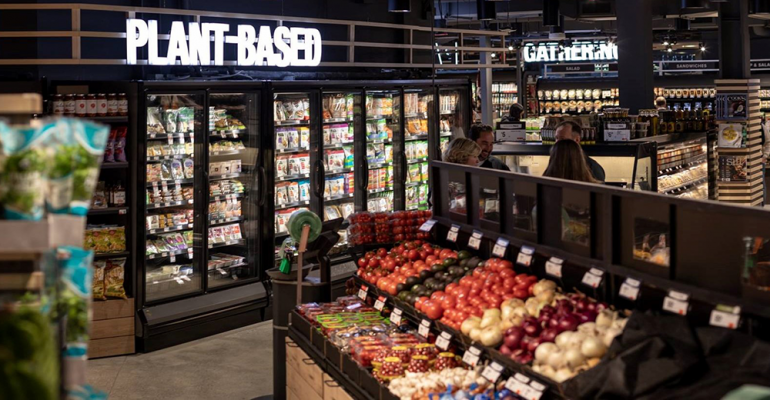U.S. retail sales of plant-based foods totaled $4.5 billion over the past year, marking growth of 11%, according to the Plant Based Foods Association (PBFA) and The Good Food Institute.
In releasing the data Tuesday, the associations said the plant-based category has generated more than five times the dollar sales growth of the overall U.S. retail food market, which saw only a 2% gain during the same period. The trend was similar for unit sales, with plant-based foods posting growth of 8.5% versus flat results for the overall retail food market.

The figures, commissioned from wellness-focused data and retail analytics firm SPINS, reflect natural, specialty gourmet and conventional multi-outlet retail sales of plant-based foods that directly replace animal products — including meat, seafood, eggs, dairy and meals containing plant-based alternatives — for the 52 weeks ended April 21.
“Plant-based foods are a growth engine, significantly outpacing overall grocery sales,” Julie Emmet, senior director of retail partnerships at PBFA, said in a statement. “We are now at the tipping point with the rapid expansion of plant-based foods across the entire store, so it is critical for retailers to continue to respond to this demand by offering more variety and maximizing shelf space to further grow total store sales.”
Over a two-year period, plant-based food retail sales are up 31%, the PBFA and The Good Food Institute noted. Dollar sales climbed from $3.4 billion in April 2017 to $4 billion in April 2018 and then to $4.5 billion in April 2019.
“This is just the beginning of a massive growth period for plant-based foods,” commented Caroline Bushnell, associate director of corporate engagement at The Good Food Institute, a global nonprofit focused on establishing a sustainable, healthy and responsible food system.
Dairy remains the biggest plant-based category. Dollar sales of plant-based milk — now 13% of the entire milk category — rose 6% to $1.9 billion during the past year, while cow’s milk sales fell 3%.
Emerging plant-based dairy product categories are expanding even faster as more households are introduced to these items, PBFA and The Good Food Institute said. In the past year, dollar sales of plant-based yogurt grew 39% (conventional yogurt declined 3%); plant-based cheese rose 19% (conventional cheese was flat); and plant-based ice cream and frozen novelties gained 27% (conventional ice cream and frozen novelties edged up 1%).

Meat is the second-largest of the plant-based food categories, with sales rising 10% over the past year to about $801 million and representing 2% of overall retail packaged meat sales, the associations reported. Leading the way are sales of refrigerated plant-based meat, which grew 37% compared with 2% for its conventional meat counterpart.
Rounding out the top plant-based food segments by dollar sales are meals at $387 million (+6%), ice cream at $304 million (+26%), yogurt at $230 million (+39%), creamer at $226 million (+40%), butter at $189 million (+5%), cheese at $160 million (+19%), tofu and tempeh at $118 million (+5%), and ready-to-drink beverages at $103 million (+23%).
Smaller plant-based food segments, however, have experienced sharp growth. For example, retail sales of spreads, dips, sour cream and sauces jumped 52% over the past year to $21 million, while egg sales surged 38% to $6 million.
“Consumer appetite for plant-based foods is surging as consumers increasingly make the switch to foods that match their changing values and desire for more sustainable options,” Bushnell added. “This growth will continue as more companies bring next-generation innovations to market that really deliver on the most important driver of consumer choice: taste.”





